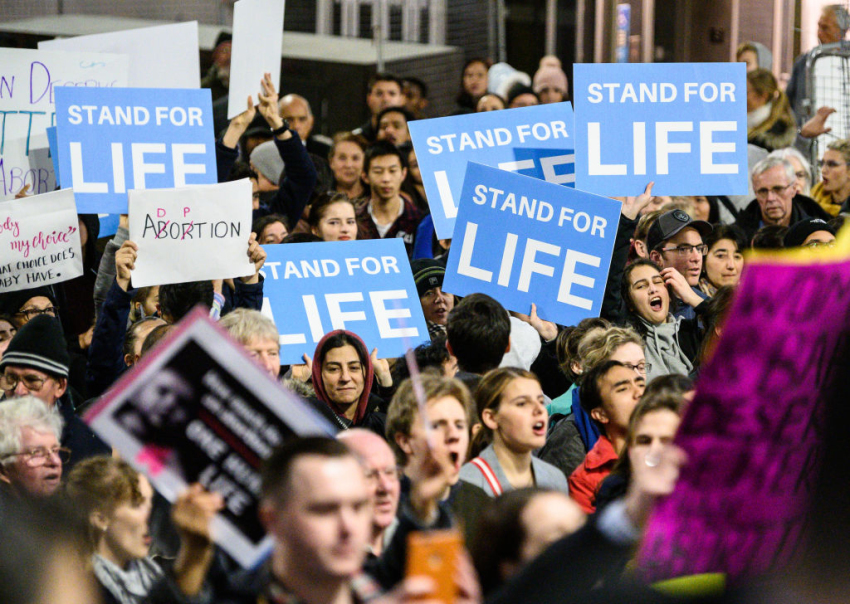42.4M babies killed by abortion in 2019; here's what's ahead for US abortion laws in 2020

In 2019, around 42.4 million pregnancies ended in abortion worldwide.
According to Worldometers, which tabulates global statistics on abortion procedures based on the most current available figures from the World Health Organization, 40 to 50 million abortions are performed annually worldwide.
The website notes that in the United States, approximately half of pregnancies are "unintended" with four in 10 ending in an abortion, amounting to over 3,000 abortions being performed every day. Not including miscarriages, 22 percent of all pregnancies end in abortion. Globally, around 125,000 abortions happen every day.
The figures come following an increased push in Southern and Midwestern state legislatures in the U.S. to save lives by setting limits on abortion and enforcing health and safety standards for clinics. Alabama passed a near-total ban on abortion, while progressive states such as New York and Illinois passed laws allowing abortion up until a baby is born. Whereas Louisiana, Georgia Kentucky, Missouri and Ohio passed laws banning most abortions as soon as a preborn baby’s heartbeat can be detected.
The abortion rate in the U.S. has fallen significantly in recent years, a decrease that is attributed to a variety of factors.
From 2014 to 2017, the number of abortions performed in the U.S. dropped from 926,190 to 862,320, a 7 percent decrease and record low, according to data compiled by the Guttmacher Institute.
The means by which abortions are carried out has also changed with medication abortions (abortion pill) increasing from 5 percent of all abortions in 2001 to 39 percent in 2017, even as abortion rates have declined.
Abortion clinics also continue to close around the nation.
The Christian Post reported Dec. 19 that a pro-abortion group called Abortion Care Network released a report titled “Communities Need Clinics” showing the number of independently owned abortion clinics — not including Planned Parenthood facilities — has declined by 32 percent since 2012, with 136 clinics having closed since 2014.
2019 also saw the abortion issue enter the public discussion in a different way through storytelling with the film "Unplanned," which is based on the experiences of former Planned Parenthood director turned pro-life advocate Abby Johnson. The film earned $21 million at the box office.
As the 2020 presidential election nears, the debate over abortion will likely animate politics as the Democratic and Republican parties write their platforms at their respective national conventions and as contested state laws are be adjudicated in court.
Every Democratic presidential candidate that remains in the race is on record saying they support taxpayer-funded abortion at the federal level. In response to questions from The New York Times, all of the candidates said they would "codify Roe v. Wade" and "repeal the Hyde amendment," the legislative provision first instituted in 1976 that forbids the use of federal funds through Medicaid or other government entities to pay for abortions. For decades the amendment had notable bipartisan support.
The Democratic presidential candidates also said they would preserve government funding for Planned Parenthood, the nation's largest abortion business.
Later this year, the U.S. Supreme Court will hear the case of June Medical Services v. Gee, which centers around a Louisiana law requiring abortionists to have admitting privileges at local hospitals. The case is the first abortion rights case to be heard since the confirmation of President Trump's nominees, Justices Neil Gorsuch and Brett Kavanaugh to the high court bench.
Depending on how the court rules, the decision will either uphold or reverse a recent ruling on a similar statute. In 2016, the court handed down a 5-3 decision in Whole Woman's Health v. Hellerstedt, striking down a nearly identical Texas law requiring abortionists to have admitting privileges at a hospital within 30 miles of the clinic where they practice.
Yet, the U.S. Court of Appeals for the Fifth Circuit, which adjudicates matters from both Texas and Louisiana, has maintained that “stark differences” exist between the factual records in the two cases.
The author of the Louisiana bill, then-state representative and now a state senator Katrina Jackson, who is African American and a Democrat, will be arguing before the Court on March 4 alongside the Office of the Louisiana Attorney General. She will again be featured as a speaker on the main stage of the March for Life on Jan. 24, having also spoken last year from the same stage.



























